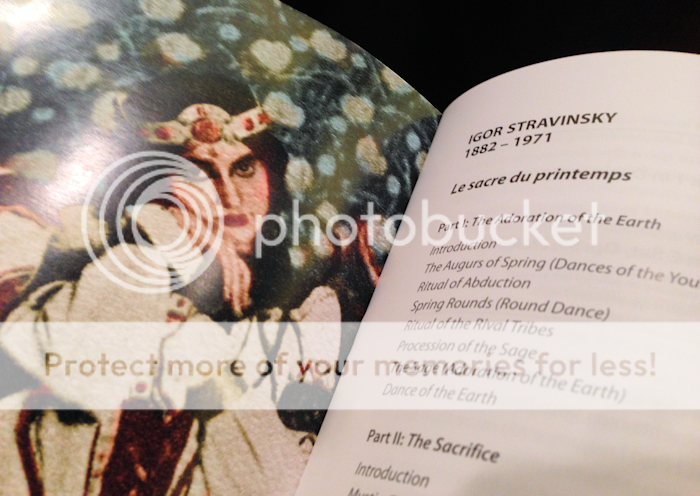Here it is! The moment I get all hyper and excited about classical music and tell you all about the concert I went to last thursday. The concert was held at the Royal Festival Hall in London and performed by the Philarmonia Orchestra. It marked and celebrated the 100th Anniversary of Stravinsky's revolutionary ballet La Sacre du Printemps, or 'The Rite of Spring'. Stravinsky's piece was not the only one in the program which included Prélude à L'Après Midi D'Un Faune by Debussy and Amériques by Varèse.



The evening itself was magical. The program complemented eachother exquisitely with the Debussy and Varèse also being turning points in musical development. Prélude à L'Après Midi D'Un Faune by Debussy, which was performed first, was wonderful. The piece is based on a poem by Stèphane Mallarmé which describes the sensual experiences of a faun who has just woken up from his afternoon sleep and discusses his encounters with several nymphs during the morning in a dreamlike monologue. The iconic opening flute solo was played absolutely beautiful by the soloist of the Philarmonia. It was rich in tone and was silky in its lyricism of the melody. The blend of the whole orchestra felt so complete and displayed the mystical picture of the faun and woodland exquisitely - it was like hearing a water colour painting. The harmonies that come through are heartbreaking. By the end of the piece I was in tears from its sensitivity and beauty - an incredibly moving performance.
Amériques by Varèse is a piece I had never heard before so I had no idea what to expect. Prélude à L'Après Midi D'Un Faune was the piece that actually made him want to be a composer and in the piece you can hear similarities with Debussy's piece, particularly the alto flute solo at the beginning of Amériques but you will also hear Modernist influences, such as that from Stravinsky. Varèse began writing Amériques when he arrived in America in 1915 - in the words of Esa-Pekka Salonen, the conductor of the Philarmonia, it was first piece that you are launched into a 'cacophony of dense, urban environment' which Varèse drew from his first impressions of the noises of the West Side of Manhattan: an aural explosion of street noises, police cars, firetrucks, river sounds, foghorns, and skyscraper constructions which are extremely well represented in the piece. Varèse swells the orchestra to ginormous proportions and even the reduced scoring calls for 9 percussionists, as well as depicting an unusal array of sounds, including lion's roar and the piece's signature sound of the wailing siren. The performance by the Philarmonia itself is mindblowing! Auralling, the performance was extremely powerful, but visually too the orchestra breathed of excitement - the percussionists were particularly entertaining to watch and you can understand why in the sheer volume created by the percussion. Their sticks were flying about everywhere. The end of the piece blew my head off!!! I don't know if it exists, but it sounded like 'ffffff'. The extended dissonant chord with an incredible crescendo drummed through the hearts of every audience member - it was met with a tumultuous roar and applause. Speechless I was!
And finally came The Rite of Spring. I've written a lot about this, so I won't go on for too long and I think it would be better if you listened to it instead. But, the performance was a dream. I'd wanted to see this piece performed for so long and it was met with a punchy, exciting, mind-boggling, tear-jerking spectacle. The Varèse was a hard act to follow, but by God did it follow triumphantly. Happy 100th Birthday Rite of Spring - lets hope people will still be celebrating it in another 100 years.
The performance itself was live on Radio 3 and you can still listen to it here on BBC iPlayer including some brilliant commentary - http://www.bbc.co.uk/i/b01slnqk/ - I urge you to have a listen!
Until next time lovelies! Peace. Love Alice xxx

No comments:
Post a Comment